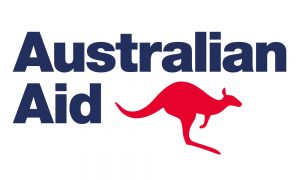Achieving better outcomes for people affected by crisis.
Focusing on the Indo-Pacific region, Humanitarian Horizons works with our partners to ask the hard questions about how things can be done differently and provide alternatives to make change happen.
The program has been at the forefront of humanitarian thinking and practitioner-based research in our region over the past five years. The 2021-24 program builds on our experience and research work from the pilot phase (2017–18) and the Humanitarian Horizons 2018– 21 program.
The proposed research program for 2021–24 builds on achievements to date via three interlocking research streams. All streams reflect our commitment to locally informed humanitarian research and approaches that support constructive change.
Humanitarian Horizons is delivered by HAG in partnership with trusted regional partners and is funded by the Australian Government through the Department of Foreign Affairs and Trade (DFAT). The views expressed through this research are the authors’ alone and are not necessarily the views of the Australian Government.

The shift to a more localised and equitable system that facilitates ethical and effective humanitarian action must be built from evidence and clear pathways for action.
Supporting the sector to measurable reduce the negative impacts of humanitarian on the climate and environment is critical to work towards a joint creation of a vision for Green Response.
Translating research into practice remains challenging. Creating a space for brave debates on newly emerging issues for time-poor practitioners and policy-makers is essential for the humanitarian sector.
Humanitarian Horizons is constantly learning and adapting to maximise the impact of research findings through partner engagement and accountability, transparency, ethical principles and its Research Advisory Committee.
The conceptualisation and design process included consultations through key informant interviews, regional briefings for the Pacific, South Asia and Southeast Asia, a global survey, findings from an independent Mid-Term Review of the current Humanitarian Horizons program and desk review to capture the current state of knowledge related to the research streams.
Our guiding principles and values underpin the research program and will also inform the development of our research partnerships.

Ethical
In the Humanitarian Horizons research program and throughout our work, we adhere to ACFID’s Principles and Guidelines for Ethical Research and Evaluation in Development. Respect for and commitment to these principles is reflected in the work that we do and the way that our organisation is structured.

Equitable and partnership-based
In line with our commitments to localised research and working with fellow humanitarians, we will build on our current partnerships and identify new collaborations with organisations and national experts based on our research focus.
Localised and inclusive
Our research is designed to be culturally sensitive and appropriate, with consideration and appreciation of context at every stage. We aim for diversity and representation in our research process, participants and products.

Ahead of the curve
We will conduct research that delivers thinking, tools and solutions that will proactively drive change within the humanitarian sector. This means being willing to take on challenging subject matter and ambitious goals.

Evidence based
To optimise the behavioural effectiveness of our research, strategy and intervention development, we will incorporate insights from behavioural science. It is a scientific, evidence-based approach to understanding and changing behaviour.

Rigorous
We work hard to ensure that all our research products meet high standards of research rigour. We believe that this is best achieved by identifying, sharing, and building expertise across the team and by engaging systematic peer review processes of our products.

Replicable and open source
We strive to make our research work relevant to and replicable across the wider humanitarian sector. We will continue to share program purposes, design thinking and research tools publicly, such as the Measuring Localisation Framework and Tools.

Climate conscious and COVID cognisant
In line with localisation principles and our 2030 Net Zero commitment, HAG will minimise the travel undertaken for our research. We believe in empowering and trusting our national partners to deliver research on the ground, as we have shown throughout 2020 and 2021.

Accessible and practitioner-oriented
To encourage the greatest possible impact, the communication of Humanitarian Horizons research will be varied and accessible, reflecting the needs of diverse readerships and of practitioners.
Our research is designed to be culturally sensitive and appropriate, with consideration and appreciation of context at every stage. We aim for diversity and representation in our research process. Humanitarian Horizons will draw on best practice in localised approaches to research, including examples from our own work in the Pacific such as the Localising the Research Process: Walking the Talk Insight Series and our ongoing partnership with PIANGO.
Partnerships are central to our way of working and we believe that working in partnership enables a collective contribution that can more effectively drive positive change in the humanitarian system. That is why we are committed to collaborating with other organisations – particularly national researchers and organisations – to achieve collective impact in a meaningful, mutually beneficial way. We are guided by our Partnership Framework which provides a basis for us to engage with existing and prospective partners.

Our approach aims to track not only research outputs, but also impact on thinking and practice. In order to do this, we need to recognise and factor in the time between generating evidence through research and the subsequent impact on the sector that may evolve over several months and years. For this reason, our existing Monitoring and Evaluation Framework will continue to track the impact of the existing research portfolio into 2021-22, at the same time as building a rigorous approach to monitoring impact of the new research streams.
Read the latest tracking impact report from our 2018-21 program.
The 2021–24 Humanitarian Horizons program will develop a strategic communication and engagement strategy that aligns with the overall organisational communications strategy. It will allow HAG and partners to act on the mid-term review recommendation to improve the strategy, visibility and resourcing of our communication and engagement.